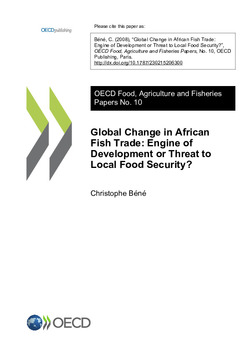Global change in African fish trade: engine of development or threat to local food security?

Citation
Béné, C. (2008). Global change in African fish trade: engine of development or threat to local food security?. OECD Food, Agriculture and Fisheries Working Papers no. 10
Today fish is the most traded food commodity in the World. This situation is not without generating potential issues. On the one hand, fish trade is said to support economic growth processes in developing countries by providing an important source of cash revenue. On the other hand, fish trade is also said to lead to a decline in food security and a decrease in the availability of fish for the local population. In this paper we explore more thoroughly those two opposite views in the specific case of sub-Sahara Africa. For this we consider a range of eight national development indicators that encapsulate both economic and wellbeing of sub-Sahara countries over the last decade and correlate them against four indicators reflecting the country-specific importance of fish trade, industrial and small-scale fisheries in the economy of Sub- Sahara Africa. Our statistical analysis shows that when sub-Sahara countries’ data are considered at the macro-economic level the fear that fish trade may affect negatively fish food security is not substantiated by any statistical evidences. At the same time the analysis also shows no evidence to support the claim that international fish trade contributes effectively to national economic development and/or wellbeing. The last section of the paper discusses the various possible reasons for this apparent lack of correlation and highlights the respective flaws underlying the two opposite discourse about the role of fish trade in national development and food security.
Permalink
Date Available
Type
Publisher
Language